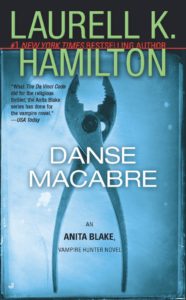 So, here’s a possibly interesting tidbit about Danse Macabre. When I first knew of its existence in hardback, I wasn’t yet halfway through the series, and it looked like a lot of change was in store ahead. Anita was going from a zombie animator and vampire killer and unofficial detective to federal marshal? Cool beans! Pregnancy scare? Sure, fair enough, she’s got a boyfriend and maybe a second one. This would have been 2006, I guess?
So, here’s a possibly interesting tidbit about Danse Macabre. When I first knew of its existence in hardback, I wasn’t yet halfway through the series, and it looked like a lot of change was in store ahead. Anita was going from a zombie animator and vampire killer and unofficial detective to federal marshal? Cool beans! Pregnancy scare? Sure, fair enough, she’s got a boyfriend and maybe a second one. This would have been 2006, I guess?
Also, that probably wasn’t interesting at all, but it was pretty much the only thing I could think of to type that wouldn’t be dripping with vitriol, and it seems fair to give my readers a safe haven wherein they can decide to not keep going.
Because, Jesus God, this is a fucking terrible book. It spans 48 hours leading up to a vampire ballet performance, which latter part might have been pretty cool to watch, I guess? It was ten of the maybe fifteen pages where I didn’t want to claw my eyes out of my head while reading it, anyway, so I can’t help but look upon the scene fondly, y’know? In the meantime, there are these five hundred pages spanning these 48 hours, in which nothing of any interest happens. Anita might be pregnant, and she’s going to be sure to be strong about it except for fighting with all of her friends, or maybe that should be the definition of strength instead of an exception. But she also just might carry a bunch of impossible virii and be way stronger than anyone yet suspects, instead of being pregnant. All those Master Vampires they’ve invited to town for the ballet might have been a bad scary idea that will destroy their lives, or maybe they’ll gain all kinds of new power by having giant vampire orgies instead. She’ll certainly have to manage the expectations and feelings of her myriad emotionally crippled boyfriends, sure the normal ones like Richard and Nathaniel and Jason, but let’s not forget all the awesome non-names we can throw around, like Haven or Wicked or Truth or London or Asher or for fuck’s sake Requiem! And as if that weren’t bad enough, the Master of Chicago is named Augustine, which would be like a breath of fresh air except that he’s older than perennial fan favorite Jean Claude, and yet everyone calls him Auggie. AUGGIE!!!!
It’s like… well, I know I’ve mentioned Mary Sue before, but to sum up right quick, Mary Sue is a character in Star Trek fan fiction from probably the ’70s, who was written as a stand-in for the author, and she shows up every main character you’ve heard of on the Enterprise, she’s the one person with all the special skills and talents to save the day, plus pretty much everyone wants her in the worst way. It’s not that Anita Blake is a Mary Sue kind of character. It’s not THAT SIMPLE. It’s like, in these last few books, Anita Blake is the character that the original fictional Mary Sue would have written, if she herself were an author in addition to her many space-faring talents.
The worst part? I actually finished the book. I don’t exactly know how. I mean, at the beginning, I wasn’t angry, I just wanted to quit because it was so unpleasant. But it felt at that point like I was having an unfair personal reaction to some story elements, so I persevered. Eventually the relief of that part of the plot fading out of prominence got me through the interminable middle section in a bull-rush. And by the time I realized that every time I read more than a page at a sitting, I got angry, I was a) almost finished and b) didn’t have access to the next book I wanted to read. And by the time I solved that problem, I was really almost finished, and the old idiotic completionism had kicked in. But, seriously, I think I accidentally got a little drunk on Wednesday night because I was reading, and if I couldn’t focus on the book, I wouldn’t have to read anymore. I don’t so much no longer care about these characters as I sincerely want them all to die in a fire. And I’m in the unique position of being able to make that happen. But it seems like I shouldn’t?
Anyway. Here’s what does happen: Anita gets threatened in dreams by the First Evil, or the Queen of the Damned, or someone like that. The Mother of Night, there we go. Anyway, she’s the very first vampire, and she’s been waking up gradually for a few books now. And then later, Anita talks to a guy who was made a vampire by that one chick, and who might be the Arthurian Merlin instead of just a vampire with a similar name, and who is certainly the first dude in a long time that might be more powerful than our merry band of sex-starved heroes. Which might matter, except he wants to sign on with them instead of oppose them? I guess I just ruined the book, but if I can tell you every single plot event that occurred in only two-ish sentences, it may just be that someone else ruined the book first.
God! I can’t stop being pissed off about this!
And all the fucking horrible verbal tics! “That wonderful Gallic shrug that meant everything or nothing.” “[This or that sexual pecadillo] just flat did it for me.” The repetition between thought and action, along the lines of, say, someone asks a question, then our author types, “I didn’t know the answer to that. ‘I don’t know the answer to that,’ I said.” I mean, the first few and others that I thankfully can’t recall offhand, there’s no reason for you to read them and understand how, after a dozen books of the same phrases over and over again, I am boiling with fury at the memory. But that last repetition thing? Who is possibly allowed to write like that?!
Okay. Okay. I’m stopping now. Fuck!
 I can’t even remember exactly why I picked the book up in the first place. Most likely, there was an internet discussion about which urban fantasies were worthwhile and why, and after the Harry Dresden and Anita Blake books[1], the Rachel Morgan series was the only one that struck my interest. Anyhow, between the amount of time I spend at various Half Price Books around the metroplex and the amount of depth on my to-read shelf[2], I can’t exactly be surprised that I’d bought five books into the series without ever having read the second sentence of
I can’t even remember exactly why I picked the book up in the first place. Most likely, there was an internet discussion about which urban fantasies were worthwhile and why, and after the Harry Dresden and Anita Blake books[1], the Rachel Morgan series was the only one that struck my interest. Anyhow, between the amount of time I spend at various Half Price Books around the metroplex and the amount of depth on my to-read shelf[2], I can’t exactly be surprised that I’d bought five books into the series without ever having read the second sentence of 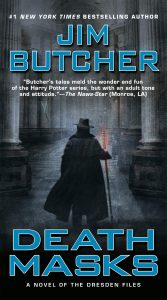 The awesome thing about reading a Dresden Files book is that I’m guaranteed it will be good, between the quality of the earlier entries in the series and the universal acclaim it has received among my friends who have read them. Plus, reading them spread out like this means I’ll still have new ones ahead of me for at least months, if not years. The downside is that it’s really hard to convince myself to read something else instead once I’m done with one. Like now!
The awesome thing about reading a Dresden Files book is that I’m guaranteed it will be good, between the quality of the earlier entries in the series and the universal acclaim it has received among my friends who have read them. Plus, reading them spread out like this means I’ll still have new ones ahead of me for at least months, if not years. The downside is that it’s really hard to convince myself to read something else instead once I’m done with one. Like now!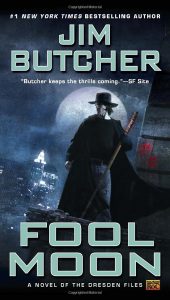 I cannot decide if my love for the Harry Dresden books comes from their being objectively awesome, or from them being in such sharp contrast to the Anita Blake books. I mean, sex happens, but it’s dealt with tastefully, with soft-focus lensing and quick cut-aways, and far more importantly, it is not the constant focus of Harry’s regular magic-wielding, mystery-solving lifestyle. Which leaves him some time to think about wielding magic and solving mysteries. Is the prose with which he wields his magic, the world-building in which he solves his mysteries, the characterizations that come into play when he interacts with the other, er, characters really any better than most books I read? I’m going to guess that probably not, and yet I could grab the next three that I currently own and read them all in a row without getting the least bit tired of it. Um, unless the plot suddenly changes into a situation where he’s banging the vampire chick Bianca like a drum and his cop friend starts hating him and he wallows in angst by taking up with a werewolf pack? Don’t be sexy, Harry! It’s not worth it!
I cannot decide if my love for the Harry Dresden books comes from their being objectively awesome, or from them being in such sharp contrast to the Anita Blake books. I mean, sex happens, but it’s dealt with tastefully, with soft-focus lensing and quick cut-aways, and far more importantly, it is not the constant focus of Harry’s regular magic-wielding, mystery-solving lifestyle. Which leaves him some time to think about wielding magic and solving mysteries. Is the prose with which he wields his magic, the world-building in which he solves his mysteries, the characterizations that come into play when he interacts with the other, er, characters really any better than most books I read? I’m going to guess that probably not, and yet I could grab the next three that I currently own and read them all in a row without getting the least bit tired of it. Um, unless the plot suddenly changes into a situation where he’s banging the vampire chick Bianca like a drum and his cop friend starts hating him and he wallows in angst by taking up with a werewolf pack? Don’t be sexy, Harry! It’s not worth it!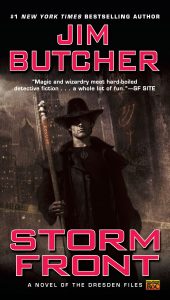 By right of expectation, this should be a graphic novel review. I’ve been pretty darn faithful about the alternating thing, and such. But then I went on vacation, in which there was a beach, and more importantly, an ocean. Also there were friends and children and laughing and a board game. And also, because I live inside myself so much and it’s worthwhile to reiterate the things that really affect me, on a bone-deep level, there was still an ocean. She had waves and a loud voice, and we had a friendly tussle in which she made sure to show me she could kill me at any moment without a thought, but that was only momentary and to demonstrate who was who; like I said, it was friendly. And just for me, flying in the face of all established knowledge on local weather patterns, she put a storm on the horizon.
By right of expectation, this should be a graphic novel review. I’ve been pretty darn faithful about the alternating thing, and such. But then I went on vacation, in which there was a beach, and more importantly, an ocean. Also there were friends and children and laughing and a board game. And also, because I live inside myself so much and it’s worthwhile to reiterate the things that really affect me, on a bone-deep level, there was still an ocean. She had waves and a loud voice, and we had a friendly tussle in which she made sure to show me she could kill me at any moment without a thought, but that was only momentary and to demonstrate who was who; like I said, it was friendly. And just for me, flying in the face of all established knowledge on local weather patterns, she put a storm on the horizon.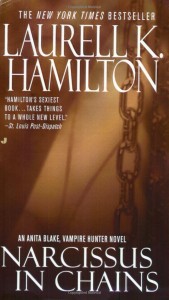
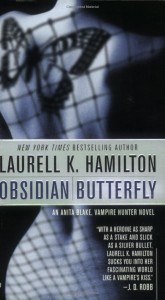
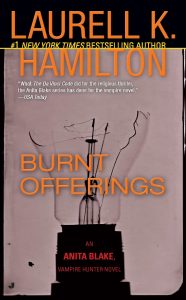 I had this whole big plan, I remember distinctly. Stay away from the vampire nearly-porn stuff for a little while. Alternate between the stack of hardbacks and the stack of graphic novels, knock out several reviews in a reasonably short time as a result. And, okay, the last part is likely to occur, or at least no less likely. But the problem with being on a plane (aside from all the motherfucking snakes, I mean) and not checking any bags is that it’s not worth it to try to bring along an unwieldy and damageable graphic novel when you could bring along a cheap paperback instead. And so, regrettably, I have read another tale of the exploits of Anita Blake.
I had this whole big plan, I remember distinctly. Stay away from the vampire nearly-porn stuff for a little while. Alternate between the stack of hardbacks and the stack of graphic novels, knock out several reviews in a reasonably short time as a result. And, okay, the last part is likely to occur, or at least no less likely. But the problem with being on a plane (aside from all the motherfucking snakes, I mean) and not checking any bags is that it’s not worth it to try to bring along an unwieldy and damageable graphic novel when you could bring along a cheap paperback instead. And so, regrettably, I have read another tale of the exploits of Anita Blake.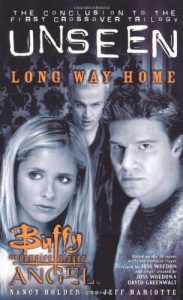 In retrospect, I’m glad I didn’t figure out how deeply flawed the final volume of that Buffy/Angel crossover series was until the last 50 pages or so. Because, I have this habit of not letting things go, however terrible, until I’m through with them, and it would have sucked to bitch to myself constantly for 300 pages instead of only 50. Seriously. There was this bowl of queso at lunch yesterday that tasted truly awful, but I kept re-tasting it because part of it reminded me of some other taste, and I couldn’t quite put my, er, tongue on it. Meanwhile, my co-diner was actually throwing up due to the chemical poisoning from whatever plastic thing had melted into the queso mix. I’d like to think that if she’d been throwing up before I kept re-tasting, that would have stopped me. I really, really would love to think that.
In retrospect, I’m glad I didn’t figure out how deeply flawed the final volume of that Buffy/Angel crossover series was until the last 50 pages or so. Because, I have this habit of not letting things go, however terrible, until I’m through with them, and it would have sucked to bitch to myself constantly for 300 pages instead of only 50. Seriously. There was this bowl of queso at lunch yesterday that tasted truly awful, but I kept re-tasting it because part of it reminded me of some other taste, and I couldn’t quite put my, er, tongue on it. Meanwhile, my co-diner was actually throwing up due to the chemical poisoning from whatever plastic thing had melted into the queso mix. I’d like to think that if she’d been throwing up before I kept re-tasting, that would have stopped me. I really, really would love to think that.